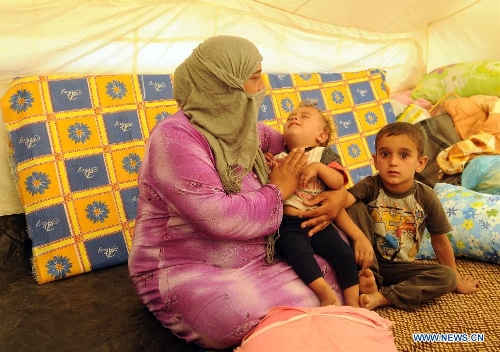France backs action on Syria while China advocates caution

Syrian refugees are seen in a refugee camp at the Quru Gusik in Iraq, Aug. 25, 2013. The United Nations' refugee agency on Tuesday called on Syria's neighbors to accept all the Syrians who were forced to flee the bloody conflict in their homeland. (Xinhua/Liang Youchang)
Chinese Foreign Minister Wang Yi on Friday reaffirmed China's resolute opposition against the use of chemical weapons during a telephone call with his French counterpart Laurent Fabius.
Wang stressed the need to support UN inspectors in their independent, objective and professional investigation into the alleged use of chemical weapons in Syria.
"It is to be determined not only if chemical weapons have been used but who have used them," Wang said, adding that establishing the facts is the prerequisite for any actions.
Various parties need to adopt a cautious, responsible attitude toward the major issue on war and peace, said Wang.
The talk came after French President Francois Hollande gave a boost Friday to US hopes of forging a coalition for possible strikes against Syria after British lawmakers rejected any involvement.
The White House signaled Thursday that President Barack Obama, guided by the "best interests" of the US, was ready to go it alone on Syria after chemical weapons attacks.
But Russia, Syria's ally, warned any military strikes would "deal a serious blow to the entire system of world order."
Russian Deputy Prime Minister Gennady Gatilov said Russia opposes any resolution "indicating the probability of the use of force" or "that could be used for military action against Syria."
UN experts began a final day of inspections of the sites of the suspected attacks before they leave the war-battered country Saturday and report their findings to UN chief Ban Ki-moon.
Wang Yi told Ban Friday that China supported independent and objective inspections free from outside pressure.
While Germany and Canada ruled out joining any strikes, Hollande said the British vote would not affect his government's stance. "France wants firm and proportionate action against the Damascus regime," Hollande told Le Monde newspaper, hinting an attack was possible by Wednesday.
US Defense Secretary Chuck Hagel said the White House was still seeking an "international coalition that will act together" against Syria's regime.
The British rejection also came after the failure of an 11th-hour effort by British diplomats to win UN backing for action at a meeting of the Security Council permanent members.
Li Jie, a research fellow at the Chinese Naval Research Institute, said if a military strike were launched, it would likely take place ahead of the G20 summit from September 5 to 6 in Russia.
He said potential action probably would only involve air and naval forces, like NATO's intervention in Kosovo.
"NATO will not take part in the coalition," its head Anders Fogh Rasmussen told Danish media Friday.
Israel Friday deployed its Iron Dome missile defense system in Tel Aviv, amid fears that Assad or his allies in Lebanon would target the Jewish state.
Li Weijian, director of the Institute of Foreign Policy Studies of the Shanghai Institutes for International Studies, said Syria is aiming to win sympathy from the Arabian countries. "Even nations like Saudi Arabia, the United Arab Emirates and Qatar, possible allies for any US-led military action, may change their stance if Israel were involved."
Agencies